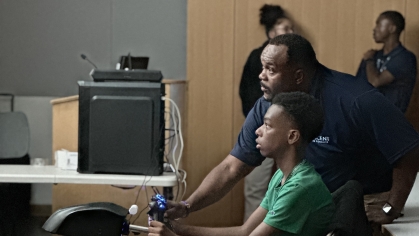Institute of Jazz Studies Receives Archives of Noted Jazz Singer Abbey Lincoln
The Rutgers Institute of Jazz Studies has received the archival collection of noted jazz singer Abbey Lincoln (1930-2010). Lincoln, best known as one of jazz’s leading song stylists, was also a composer, actress, writer, and civil rights activist. The collection includes music manuscripts and scores, scrapbooks, photographs, recordings of unissued performances and interviews, and manuscripts of original writings, ranging from autobiographical to fiction and poetry.
Speaking on behalf of the family, Abbey Lincoln’s brother, David Wooldridge, Sr., said, "We are delighted that Abbey's collection will be part of the archive of the Rutgers Institute of Jazz Studies, which has such a fine reputation among musicians and scholars. We’re confident that IJS is the right place to preserve these treasures and make them available for future generations. I look forward to working with the staff at Rutgers to ensure the continuation of Abbey's legacy.”
Abbey Lincoln was born Anna Marie Wooldridge in Chicago in 1930 but grew up on a farm in Michigan with her 11 siblings. The family had a piano and the youngster was drawn to music at an early age. Inspired by the recordings of Billie Holiday, Dinah Washington, and Sarah Vaughan, she began to sing in church and school, and by her late teens was already working professionally. She moved to California, spent a year in Hawaii, and upon her return to Los Angeles sang in local clubs and, changing her name to Abbey Lincoln, recorded her debut album for Liberty Records in 1956. Around this time, the singer, who had proven to be a talented actress in high school, began to receive offers for film and stage appearances. In 1957 she sang in the film The Girl Can’t Help It, in which she appeared in a gown worn by Marilyn Monroe, and toured in the stage show Jamaica. Lincoln received a Golden Globe nomination for her 1968 appearance in For Love of Ivy with Sidney Poitier.
When she married drummer Max Roach, with whom she had collaborated on the landmark 1960 recording We Insist! Freedom Now Suite, Lincoln became a committed civil rights and women's rights activist while continuing to evolve as an artist. She began to compose, delivering her own powerful and poetic lyrics in a very personal and evocative style that was entirely her own. In the 1990s, Lincoln’s made a series of recordings for Verve, which brought the singer even wider critical and popular acclaim and two Grammy award nominations. In 2003, she was named a National Endowment for the Arts Jazz Master, the nation’s highest jazz honor. In later years, Lincoln also turned to art, producing many evocative works in a number of media.
The Institute of Jazz Studies, the world’s largest jazz archive, is a special collection of the John Cotton Dana Library on the Rutgers University campus in Newark, NJ. The Abbey Lincoln Collection has been processed by IJS archivist Anders Griffen under a grant from the Council on Library and Information Resources (CLIR). A finding aid for the collection is available: http://newarkwww.rutgers.edu/IJS//collections/lincolnf.html
Media contact: Vincent Pelote, pelote@andromeda.rutgers.edu; 973-353-5595; fax 973-353-5944

